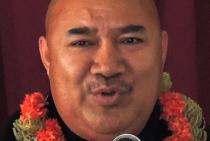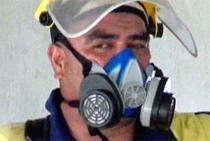"Use antibiotics responsibly" is the theme of a World Antibiotics Awareness Week launched in Nuku’alofa on Monday, November 14 to raise awareness about the serious health issue of antibiotic resistance. Tonga's doctors pointed out that misuse of antibiotics is not only dangerous but also costly and urged Tongans to adopt better hygiene to help fight the spread of infectious diseases.
You are here
Results for WHO
Tuesday 15 November 2016
 Premium content
Premium content
Nuku'alofa, Tonga
Monday 8 February 2016
 Premium content
Premium content
Nuku'alofa, Tonga
Australia will donate up to $500k to combat the Zika virus as part of an aid package to Pacific island countries to stop it from spreading and the initial focus of fighting the virus would be in Tonga, after it was confirmed five people contracted the virus and 259 suspected last week in Tonga.
Friday 22 January 2016
1 comment
 Premium content
Premium content
Nuku'alofa, Tonga
Naming Tonga the fattest nation in the world, a BBC report on 18 January 2016 says that consumption of imported mutton lamb flaps is to blame. But Tonga’s Director of Health, Dr Siale 'Akau'ola, says that it’s the quantity of food Tongans eat that’s the main problem, not mutton lamb flaps.
Tuesday 29 July 2014
 Premium content
Premium content
Nuku'alofa, Tonga
A three day meeting in Nuku'alofa of international health communicators aimed to seek new approaches to fight Non-Communicable Diseases and to promote health.
Tuesday 29 May 2012
 Premium content
Premium content
Geveva, Switzerland
It is indeed an honour and a privilege to address this important assembly today, on behalf of the Pacific island nations, namely: Cook Islands, Fiji, Kiribati, Marshall Islands, Federated States of Micronesia, Nauru, Niue, Palau, Papua New Guinea, Samoa, Solomon Islands, Tuvalu, Vanuatu, and my own country, Tonga.
Monday 23 April 2012
 Premium content
Premium content
Manila, Philippines
In the Western Pacific Region, two to three million people per year contract diseases that could be prevented by immunization. These diseases cause severe illness and, in some cases, death, the World Health Organization (WHO) stated in launching World Immunization Week on April 23.
Monday 6 February 2012
 Premium content
Premium content
Manila, Philippines
On the eve of World Cancer Day the World Health Organization (WHO) urged governments to strengthen national control programmes, including by raising awareness, amid an alarming rise of cancer cases. WHO's Western Pacific Region bears a significant share of the global cancer burden, accounting for 32% of all cancers in 2008. There were slightly more than 4 million new cases of cancer in the region in 2008 – 2.31 million in men and 1.75 million in women. Nearly 2.6 million people in the region died from cancer in that year. - WHO.
Wednesday 29 October 2008
 Premium content
Premium content
Noumea, New Caledonia
The World Health Organization WHO and the Secretariat of the Pacific Community SPC have signed a new four-year Memorandum of Understanding MoU designed to improve collaboration between the two organizations and to seek innovative solutions to assist Pacific Island countries and territories to achieve better health outcomes.
Monday 13 October 2008
 Premium content
Premium content
Geneva, Switzerland
More than 75% of people suffering from mental disorders in the developing world receive no treatment or care. A new WHO programme launched today, on World Mental Health Day 2008 highlights the huge treatment gap for a number of mental, neurological and substance use disorders. Across Africa for example, nine out of ten people suffering from epilepsy go untreated, unable to access simple and inexpensive anticonvulsant drugs which cost less than US$5 a year per person.
Sunday 1 June 2008
 Premium content
Premium content
Geneva, Switzerland
The World Health Organization (WHO) today urged governments to protect the world's 1.8 billion young people by imposing a ban on all tobacco advertising, promotion and sponsorship.
Tuesday 26 February 2008
 Premium content
Premium content
Geneva, Switzerland
Multidrug-resistant tuberculosis (MDR-TB) has been recorded at the highest rates ever, according to a new World Health Organization (WHO) report that presents findings from the largest survey to date on the scale of drug resistance in tuberculosis.
Thursday 10 January 2008
 Premium content
Premium content
Geneva, Switzerland
A large national household survey conducted by the Iraqi government and the World Health Organization estimates that 151 000 Iraqis died from violence between March 2003 and June 2006.
Thursday 13 September 2007
 Premium content
Premium content
Geneva, Switzerland
A new book of pocket-charts that will help health workers to identify people at risk of heart attacks and strokes and save lives by prescribing the most appropriate treatment is published today by the World Health Organization (WHO). The charts can be adapted for use in any setting, in any country, with any patient.
Wednesday 16 May 2007
 Premium content
Premium content
Geneva, Switzerland
The World Health Assembly opened with an optimistic assessment of the global health scene from the new Director-General of the World Health Organization (WHO), Dr Margaret Chan, and a call for global health leaders to build a "health legacy" for women and the people of Africa.
Sunday 13 May 2007
 Premium content
Premium content
Geneva, Switzerland
The Sixtieth World Health Assembly (WHA) will take place from 14-23 May 2007 at the Palais des Nations, Geneva, Switzerland.
Thursday 26 April 2007
 Premium content
Premium content
Geneva, Switzerland
As part of a concerted effort to ensure more equitable access to a potential pandemic influenza vaccine, six developing countries are being awarded grants to establish in-country manufacturing capacity for influenza vaccine. The countries are Brazil, India, Indonesia, Mexico, Thailand and Viet Nam.
Pages
- « first
- ‹ previous
- 1
- 2
- 3





